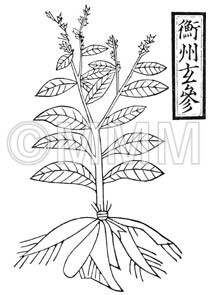Crude drug sample data base
※Click on the image to enlarge it.
Scientific information data base
| Common name | 玄参, Xuanshen, Scrophulariae Radix (Non-JPS2022, CP2020), Scrophularia Root (Non-JPS2022), Figwort Root (CP2020) | |||||
|---|---|---|---|---|---|---|
| crude drug image |
| |||||
| Original plant name | Scrophularia ningpoensis Hemsley or Scrophularia buergeriana Miquel1, (Gomanohagusa1) | |||||
| original plant image |
| |||||
| Family name | Scrophulariaceae | |||||
| Used part | root | |||||
| Quality for selection | Good one is light brown externally. The inside is enlarged, black and rich in moisture. (NI) | |||||
| Official compendium | Non-JPS (2022), CP (2020 ed.) | |||||
| Clinical application | As an anti-febrile, tranquilizer, anti-inflammatory drug and removing sores, it is used to treat febrile disease, sore throat, rhinitis, carbuncles, scrofula and constipation. | |||||
| Medical system | Traditional Chinese medicine | |||||
| Drug effect in traditional medicine | Traditional classification | Drugs for eliminating heat from blood | ||||
| Beneficial effect | [Property and Flavor] Mild cold; sweet, bitter and salty. [Meridian Tropism] Lung, stomach and kidney meridians. [Actions] To clear heat and cool the blood, nourish yin and downhear fire, remove toxin and dissipate binds. [Indications] Heat entering nutrient-blood aspects, macula and papule caused by warm toxin, febrile disease damaging yin, crimson tongue, vexation and thirst, constipation caused by fluid comsumption, steaming bone, cough caused by somsumptive disease, red eyes, sore throat, diphtheria, scrofula, swelling abscess, sore and toxin. | |||||
| Chemical constituent | Monoterpenoids Iridoids: (*C1): Harpagide Sterols (*C1): Phytosterol Phenylpropanoids p-Methoxycinnamic acid | |||||
| Chemical structure |
※画像をクリックすると、拡大して表示されます。 | |||||
| Pharmacological effect | Cardiotonic, vasodilation, decrease in blood pressure, decrease in blood sugar, local irritation, antifungal (extract), antifebrile (p-methoxycinnamic acid). | |||||
| DNA sequence | AF034865, AF034872, AF118802, AF118803, AJ236031 | |||||
| Classical reference (Chinese Herbal Classic "Zhenglei bencao") |  ※Click this image to see the actual image ※Click this image to see the actual image | |||||
| Disease | High fever, Disturbance of consciousness, Swelling and pain of the throat, Red eye, Hot flash, Cough, Hemoptysis, Thromboangiitis obliterans, Cervical lymphadenopathy, Tuberculosis, Constipation | |||||
| Formulation | Kamiuntanto, Seinetsuhokito, Seinetsuhoketsuto, Byakugokokinto, Seiishakato, Seiinrikakuto | |||||
| References | Non-JPS2022: The Japanese standards for non-Pharmacopoeial crude drugs 2022. CP2020: Pharmacopoeia of the People's Republic of China 2020 edi. C1)The Encyclopedia of Wakan-Yaku with Color Pictures Vol. I, p 56. | |||||
| Remarks | Both Korean and Japanese Xuanshens are the roots of Scrophularia buergeriana Miq. (Jap. name: Gomanohagusa). However, there is no Japanese product in the market at present. | |||||
| Last renewal date | 2023/11/21 | |||||










